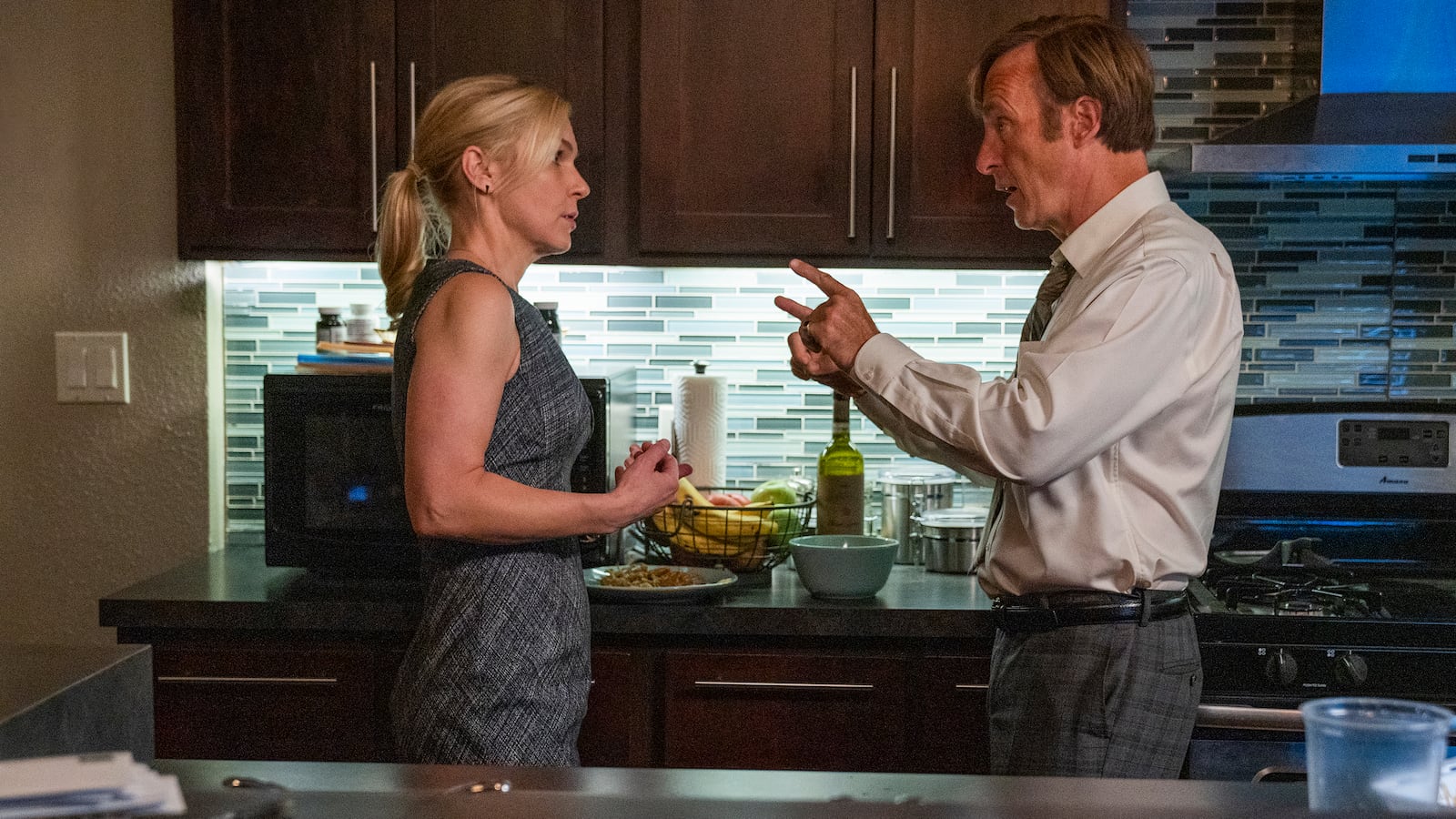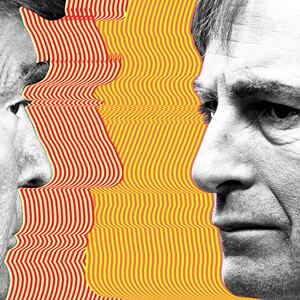Rhea Seehorn may be best known for playing the very serious Kim Wexler on Better Call Saul. But for the first 15 years or so of her acting career, she couldn’t break out of the “sitcom” box. This fall, while fans eagerly await that Breaking Bad spin-off’s climactic final season, Seehorn is returning to her comedy roots as the hot-mess matriarch Debbie in Paramount+’s new animated series The Harper House.
In this bonus episode of The Last Laugh podcast, the actress opens up about getting “pigeonholed” in the comedy world, fighting to get the role that transformed her career, and then proving that she can still be hilarious by going toe-to-toe with Julia Louis-Dreyfus on Veep. Plus, Seehorn teases season 6 of Better Call Saul, including what it’s been like to have Bob Odenkirk back on set after his heart attack, how she feels about Tony Dalton’s Lalo surviving last season’s finale, and what those finger guns were all about.
Seehorn hesitates ever so slightly when I ask if I’m catching her by Zoom from Albuquerque, where Better Call Saul is filmed. “We have to be careful about even me saying that I’m in New Mexico, because people don’t know, does Kim survive? What happens to Kim?” she says, warily. “And by the way, I don’t actually know what happens to my character yet. But I am bereft that the series is ending.”
She confirms that she was on set when her co-star Bob Odenkirk collapsed, suffering a heart attack and scaring the crap out of his family, friends and many fans, who were eagerly awaiting any shred of good news on social media. “He’s doing great,” she says of her co-star, who is back at work shooting the final season.
Before this latest hiatus, the show shut down production for a much longer stretch last spring due to the COVID-19 pandemic. The unexpected time off gave Seehorn a chance to dive back into the comedic work that defined the earlier part of her career, heading up the voice cast of the new animated series The Harper House, which started streaming on Paramount+ last month.
Now known almost entirely for her dramatic work, Seehorn had to fight for her career-defining role on Better Call Saul because the industry saw her as nothing more than a “sitcom actress” after roles on less weighty fare like I’m With Her and Whitney.
“You can only be so lucky as to be pigeonholed when you first start doing on-camera work,” she says. “So there was nothing to bitch about, but I was getting called mostly for sitcoms.”
All of that changed when Vince Gilligan and Peter Gould took a chance and offered her the role of Jimmy McGill’s friend, love interest, and potential partner-in-crime.
Below is an edited excerpt from our conversation and you can listen to the whole thing—including what it felt like to get insulted by Julia Louis-Dreyfus’ Selina Meyer on ‘Veep’—right now by subscribing to The Last Laugh on Apple Podcasts, Spotify, Google, Stitcher, Amazon Music, or wherever you get your podcasts and be the first to hear new episodes when they are released every Tuesday.
So now that we’re heading into the final season of Better Call Saul, I was rewatching the last couple of episodes of the previous season, which are just so intense and you’re so incredible in them. I want to touch briefly on that scene where Lalo comes to the apartment, because I think it’s really a high point of the show. And I was reading that you used to flip through scripts to see if you made it through alive?
[Laughs] Yes, me and Patrick Fabian both.
So when you got to that scene, what did you think when you first read it?
I knew that the producers would call me directly. It’s not like, page by page I’m not sure if I’m dead on the next one. I wasn’t going to find out by somebody dropping a script off on my stoop, they would not do that to me. There’s always a part of me that’s just reading it as a fan for a moment. And I’m like, oh my god, oh my god and my blood pressure is rising. And then I have to say, my very next thought was, Holy shit, I don’t know if I can pull this off as an actor. It’s a great feeling to feel scared of the material, to feel challenged by the material. And then also to tell yourself, wow, they actually think I can handle this. And not just handle it, but contribute. It’s hard to actually absorb that sometimes. Like, gosh, these guys really think I can play in the sandpit with them. But you can’t sit in that feeling long because you’ve got to do your work. And Tony Dalton is an amazing performer and Bob Odenkirk is one of my all-time favorite scene partners—is and always will be. I find this show has been the most like theater of any show I’ve done because they hold wides a lot for pivotal moments. So you can use your entire body, which is something that you normally can only do on stage, because a lot of shows are obsessed with the close-up. And also they will allow eight-page talking scenes like that scene. I mean, yes, there’s a gun present, but there’s no fight, there’s no car crash.
It’s not a violent scene.
No, but it is a terrifying scene. It’s a scene about violence. And the subtext going on of, I don’t actually know Jimmy’s whole lie. He still hasn’t told me, but I’m sensing that something he’s choosing not to tell is worth the danger of not saying it. And then she steps in, for me in a way that is very much Kim. She can’t overpower [Lalo], so this switch goes off where it’s like, I have to handle this like a court case. I’ve got to defend my client and raise some decent points. And I don’t think Lalo leaves because I’m so intimidating. I think she makes some points that are true of his situation, but I also think—and Tony was so great at this—there’s a lot of calculating going on on his part of, “How can I use these two people? Maybe there’s something better to do with them than shoot them.”
So Kim and Jimmy don’t know that Lalo survived the end of the season, they think he’s dead. And I’m sure they would not be happy to know that he survived, but I would imagine that you might be happy that Tony Dalton is around for the next season.
Thrilled! Thrilled. Thrilled.
The other moment that got a lot of attention comes at the very end of season five, which is the “finger guns” gesture that Kim makes. What was your interpretation of that?
That was a really hard scene. [Better Call Saul showrunner] Peter Gould wrote it and directed it. And I loved how hard that scene was. It is extremely amorphous. It is extremely hard to pin down. As an actor, I need to know what I’m playing in those moments. When she’s playing that game back and forth about things to do to Howard and then starts getting meaner and meaner and more vicious about the things she wants to do, and then pulls it back and says, just kidding, and then maybe not. And then he’s like, “Well, you wouldn’t be able to do that.” And then she’s like, “Wouldn’t I?” From the time they get to the hotel room, Jimmy is saying, “I’m bad for you, and therefore I’m going to leave. We should break up. We should end this.” And Kim doesn’t want that. But in this situation, the audience is Jimmy’s point of view, unable to discern whether she’s being serious or not. So how do you play those intentions purposely, making it not discernible? Normally you need to be clear about your choices. But she also shouldn’t look like she’s purposely trying to confuse him. It was a very tiny needle to thread. And so we did a lot of variations, so many takes of finger guns.
There’s a finger gun montage out there somewhere?
Oh, for sure. But it was fun, because Kim has also just come off the scene with Howard who’s told her, “I just want to let you know that Jimmy’s bad for you.” Everyone’s constantly having ideas about what Kim should be and what’s good for her and what’s not good for her. And then here’s the man that I love also telling me, “I think I’m bad for you.” Like she’s not a grown adult making her own choices, which is one of the constant themes that I have loved that they have given my character. Are you a series of choices that are manufactured by who you are just innately? Or are you a series of reactions to what has happened to you in life and your relationships? Or are they converged and one or the other is constantly fighting to be the primary urge? I think there’s a little bit of her saying, “You think you know me? Everyone thinks they know me. Well, guess what you don’t know about me?” Is it true? I don’t know. Maybe it is true. Maybe you’re going to find out.
Did you relate to that at all in your own life and career, people telling you what you can be and what you should be?
Maybe. I hadn’t thought about it. That’s a good question. But probably, yeah. I don’t fit well into the molds that this business can sometimes want. And luckily that has allowed me to work with some of my favorite people in the business, because that’s exactly why they liked me. I’m so thankful, because some people don’t get that reminder—that you just being you in the way you attack your work is good and appreciated. And so I’m incredibly grateful that I’ve had a career that encourages me.
So I know you’re in the middle of filming this last season, but how are you feeling now knowing that it is almost going to be over and that you’re going to have to move on from this character and this show? I mean, it must be just so intense because you’ve been doing it for so long now.
It is. And it’s funny. We have to be careful about even me saying that I’m in New Mexico, because people don’t know, does Kim survive? What happens to Kim? And by the way, I don’t know. And just so you know, we have reshoots and we took a little pause after Bob’s heart attack. So even me being here now doesn’t actually tell you much about what happens to me or how many episodes I’m in. Because they jump back and forth in time. They do it all the time. That being said, I don’t actually know what happens to my character yet. But I am bereft that the series is ending. It’s one of my favorite characters that I’ve ever played. It’s just incredibly complex. Plus, the gift of playing a character for six seasons over the course of seven-plus years that is allowed to grow and change and constantly deepen in complexity. That’s a gift unto itself. It will be very, very hard to let go of. And I now deeply love the character of Kim Wexler. Even if I hadn’t played her, I’m so happy that this character exists on television.
Next week on ‘The Last Laugh’ podcast: Stand-up comedian Dane Cook.



